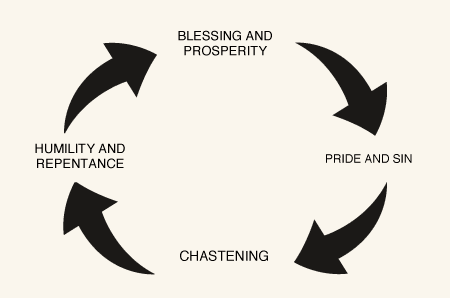W08: Beware of Pride
One of the major themes in the Book of Mormon is what we
refer to as “the pride cycle.” The
stories of various civilizations in the Book of Mormon illustrate again and
again what can happen to even the most righteous people when they succumb to
pride.
This pride cycle usually begins with a righteous person or
people who love and honor God. This righteousness
naturally invites blessings of peace and prosperity, from which eventually grow
feelings of superiority and even entitlement.
The people then forget to honor and obey the God from whom the blessings
were given and instead begin to separate themselves from one another based on worldly
things such as clothing and riches. Inevitably,
this leads to war and contention and often the loss of many lives, until the
people are sufficiently humbled and begin to call upon the Lord once more for
protection. After a period of
repentance, the people are once again brought close to the Lord and begin to
live righteously, and once again enjoy the prosperity and peace that follows. Unfortunately, this is about the time the cycle
starts all over again.
The Marriage Pride Cycle
We can find this same cycle at work in our homes and in our
marriages. We might enjoy periods of
closeness and harmony with our spouse, but eventually our pride gets the better
of us and we begin to notice things about our spouse that we dislike. We might nag, nitpick, or judge one another
until we begin to feel distance from our spouse, rather than closeness. This is contrary to what the Lord would have
us do. Our Savior is the ultimate
example of humility and patience, and He wants us to emulate Him in all things,
including in our marriages. President Ezra
Taft Benson said,
“Our degree of pride determines how we treat our God and our brothers and sisters. Christ wants to lift us to where he is. Do we desire to do the same for others?”1
This made me carefully consider all the times I tend to nag
my husband or criticize even gently the way he does things around the
house. What is the motivation for
this? I’m certainly not nagging and
criticizing because I’m hoping this will elevate my husband to a more
Christlike place. Rather, this tendency
to criticize comes from a place of pride – from feeling like I know best how to
do things and that he needs my guidance in these everyday things. This leads to tension in our home and in our
hearts. In reality, these little things
are not as important as showing appreciation, patience, support, and
forgiveness to my spouse. I can choose
to let go of these things and focus on the good in my husband instead. President Benson also taught,
“God will have a humble people. Either we can choose to be humble, or we can be compelled to be humble.”2
I certainly want to repent of my own pride and choose to be
humble, rather than having to be compelled by the Lord through trials and
suffering, and to learn about humility the hard way!
The Antidote to Pride: Repentance
 |
| image via: Army of Helaman |
Family Life Specialist, Dr. H. Wallace Goddard, has the
following to say about avoiding the pitfalls of pride,
“The natural man is inclined to love himself and fix others. God has asked us to do the opposite. We are to fix ourselves by repenting, and to love others.”3
When was the last time you felt truly changed and uplifted
by the nagging criticism of others? How
often does someone treating us with contempt and haughtiness lead us to make
positive changes in our habits? My guess
is, almost never. However, we are often
influenced and changed by another’s patience, compassion, empathy, or loyalty
to us, even when we recognize that we may not deserve it. If we truly want to uplift and encourage our
spouses, then we should show them an increase of love rather than pride. When we recognize that we, too, have flaws
and focus our efforts on repenting and keeping our hearts open to the messages
of the Holy Spirit, we will be less inclined to criticize our spouse and more
inclined to reach out to them in love.
Dr. Goddard goes on to say,
“Any time we feel irritated with our spouses, that irritation is not an invitation to call our spouses to repentance but an invitation to call ourselves to repent. We are irritated because of our own lack of faith and humility.”4
If this is true, then one of the best things we can do for
our marriages is to cultivate an attitude of humility. When we avoid the negativity associated with
pride, we can focus instead on showing love and gratitude for one another. This helps us grow the bonds of friendship
and respect, and strengthens our family relationships.




Comments
Post a Comment